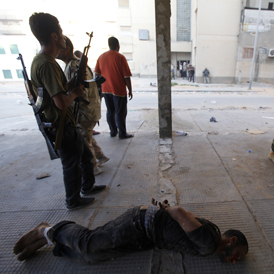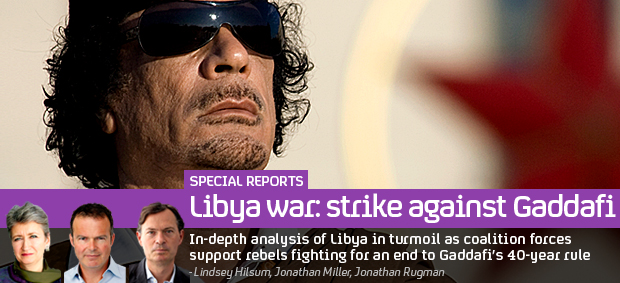African Union refuses to recognise rebels
As Libya’s National Transitional Council moves to Tripoli to attempt to restore normality, the African Union has refused to recognise the new government in a sign of support for Colonel Gaddafi.
In a setback for Libya’s government-in-waiting, the African Union (AU) has said it will not explicitly recognise Libya’s National Transitional Council (NTC.)
The union, who were financially supported by Colonel Gaddafi, said they will only recognise an inclusive governement that involves members of the old regime.
Jacob Zuma, South Africa’s leader, said the AU would not recognise the NTC as the legitimate government as long as fighting continued in Libya.
“If there is fighting, there is fighting. So we can’t stand here and say this is the legitimate (government) now. The process is fluid. That’s part of what we inform countries – whether there is an authority to recognise,” Zuma said.
NTC moves to capital
The NTC has announced it has moved to the capital after months of being based in the second city of Benghazi, even though pockets of forces loyal to Muammar Gaddafi are still active in the capital.
Rumours of Gaddafi or his sons being cornered in a block of buildings in Tripoli on Thursday have proved unfounded. Rebels seeking an end to six months of war with the capture of the despot and his inner circle continue to meet resistance from dwindling numbers of loyalists, who are nevertheless very heavily armed.
Rebels now believe that Gaddafi is somewhere between his hometown of Sirte to the east of Tripoli along the Medditeranean coast, or in the southern town of Sabah.
Nato hit Sirte
Defence Secretary Liam Fox has revealed that on Thursday night, Nato and UK forces from RAF Marham launched an attack on a command and control bunker of the Gaddafi regime in Sirte.
“We have information that there are some elements of the regime in Sirte. Where they are still continuing to wage war on the people of Libya, we will continue to degrade their military capabilities,” he said.
“The attack on the military bunker last night by the RAF was part of that.
Dr Fox went on: “It’s still important that we remove the potential for the regime to counter-attack against the NTC and to continue to wage war on their people, but it is far too early yet to say what the security situation will be in the weeks ahead.”
Battle for Tripoli - photo gallery
He added that it was the “primary responsibility” of the new government of Libya to request help from the UN if it wanted it.
Gaddafi loyalists bombarded Tripoli’s airport on Friday, damaging a plane, according to Al Arabiya.
There was an exchange of gunfire between Gaddafi forces and rebel fighters near the airport, according to the news programme.

Turkey talks
The NTC is currently holding meetings with delegates from the international community in Turkey in a bid to gain further financial support as parts of Libya experience humanitarian crises, and with Tripoli being without electricty for several days. Channel 4 News Chief Correspondent Alex Thomson has tweeted that water, too, has been cut off in much of the capital.
The United States and South Africa struck a deal to allow the release of $1.5 billion in frozen funds for humanitarian aid and other civilian needs, but Mahmoud Jibril, head of the NTC, said more was needed.
“The issue is that these funds have become more pressing in terms of the expectations since the fall of the regime – expectations have become very high,” he said.
“We will be forming an interim government in the coming period and this government will have sufficient assets to provide all sorts of services to meet the people’s needs, which must be met especially after such a long period of suffering which has lasted more than six months.”
He added: “The infrastructure is in bad shape, the power stations are out of service and there are high expectations. We are entering a phase which we could call the phase of managing expectations. We cannot deal with these expectations and what is demanded of us without the funds, which belong to Libya, so we can deliver services to the people. I believe this idea was clarified and set out and some decisions were made and I thank our brothers in Turkey today.”
UN calls for restraint
Meanwhile, the United Nations has called for restraint amid reports of abuses by both rebels and loyalists.
UN human rights spokesman Rupert Colville said it was difficult to confirm reports of summary killings and torture, but said such incidents would be investigated by the existing Commission of Inquiry on Libya.
“We urge all those in positions of authority in Libya, including field commanders, to take active steps to ensure that no crimes, or acts of revenge, are committed,” he said.
The UN has previously said some military action in Libya could amount to war crimes or crimes against humanity.
Bodies of fighters who appear to have been executed at Gaddafi’s compound have arrived at Tripoli’s hospitals.
